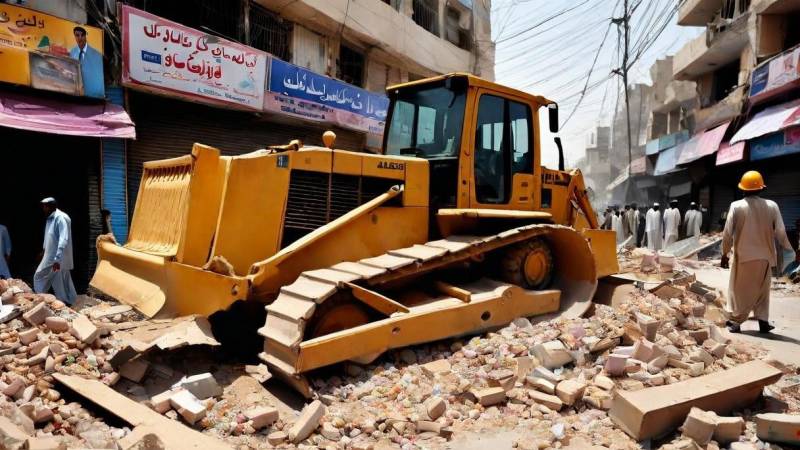
Over 75 years after gaining Independence from the British Empire, Pakistan continues to use colonial-era land acquisition laws to forcibly evict poor urban residents, store owners and vendors to make way for large public and private development projects.
This was contained in a new 48-page report published by the New York-based global rights watchdog, Human Rights Watch (HRW), on Thursday. Titled "I Escaped with Only My Life: Abusive Forced Evictions in Pakistan," the report documented widespread and abusive forced evictions that disproportionately affect the most economically and socially marginalised communities in Pakistan.
The HRW interviewed at least 36 victims of forced evictions in the urban centres of Lahore, Karachi, and Islamabad — two of the largest cities in the country and the federal capital respectively— as well as lawyers advocating for the rights of those evicted and urban planners, and reviewed court decisions and laws governing Pakistan's land tenure system.
The report said that authorities had evicted thousands of people without adequate consultation, notice, compensation, resettlement assistance, or means of redress in violation of their basic rights. It further said that the state often employed the police to evict people and that the police used unnecessary or excessive force to remove tenants, including beatings, arbitrary arrests, and destruction of personal property.
It added that the government's promotion of the development projects as serving important public functions does not lessen the avoidable harm to those affected or the government's international legal obligations to address those harms.
The forcible evictions often do more than just deprive people of their homes. It also frequently causes many people to lose their livelihoods and access to essential public services such as schools and healthcare.
"These practices worsen social and economic inequalities, disproportionately burdening people and households with low incomes, and who often are ethnic minorities," the report claimed.
The report noted that the Land Acquisition Act of 1894, introduced over a century ago, provides the template for public land acquisition in the country. The law allows authorities to acquire land for vaguely defined "public purposes," which may also include use by public-private partnerships and even private, for-profit companies.
The government also claims that the removal of structures which encroach upon public land or state property is necessary and justified since it 'encroachments' have been criminalised under the law. However, interviews with those who were forcibly displaced in the garb of anti-encroachment operations indicate that there is little consistency in the state's stated intentions and actions and often less rationale behind the use of anti-encroachment as a justification for evictions.
In one instance, the government evicted a Karachi-based shopkeeper who had been paying rent, utilities, and municipal taxes on his store for 70 years until it was demolished in 2018 on the pretext that it was an illegal encroachment. Other store owners said after their first-ever eviction, they had fallen into a cycle of perpetual evictions since they could not afford another store to sell their wares and were forced to become street vendors at the mercy of the police and anti-encroachment officials.
HRW found that the authorities frequently fail to ascertain residents' land rights beforehand and provide little, if any, compensation. In some cases, the police arrest and prosecute those who resist without a lawful basis. Other contributing factors that facilitate abuse include corruption in land acquisition, impunity for police who carry out abusive evictions, and poor land registration mechanisms that make it difficult for victims of forced evictions to prove ownership.
Activists and lawyers working on forced evictions told HRW that the authorities tended to build urban infrastructure projects in low-income areas because residents often lack titles and other legal protections and are easier to evict.
Pretexts such as climate change and environmental harm are also used to evict residents. For example, in Karachi, after the 2020 torrential rains caused widespread urban flooding, municipal authorities blamed informal settlements for blocking stormwater channels and demolished thousands of homes ostensibly to prevent future flooding. However, local activists said preventing flooding was used as an excuse to "gentrify" the area since the mass evictions have not spared the city further flooding.
In Lahore, the state forcibly acquired tens of thousands of acres of farmland and replaced it with concrete structures, exacerbating soil erosion and flooding and magnifying extreme heat.
"The Pakistani government urgently needs to reform its colonial-era land laws so that they are equitable, transparent, and in line with Pakistan's international obligations," said Saroop Ijaz, the senior Asia counsel at HRW.
"The authorities should ensure that no one is made homeless due to eviction, compensate the loss of land, and provide for the resettlement of those displaced."
The report noted that in 2018, the Supreme Court had issued a verdict noting the LAA's shortcomings and called for an overhaul of the law. However, while the legislature made some attempts to reform the law, none have been enacted. In particular, HRW asked the Pakistan government to ensure that any legislation dealing with displacement and evictions should include provisions to explore all feasible alternatives to evictions, meaningful consultation with those affected, adequate and reasonable notice before the scheduled date of eviction, and legal remedies and assistance.

